What is a Cellular Router?
A Simple Guide to Cellular Routers
The demand for cellular routers is steadily increasing, especially with the growth of IoT. They make accessing the internet incredibly easy without needing a DSL, cable, or fiber connection. But what exactly are cellular routers, and how do they work? Let’s dive in.
We fix poor cell phone signal! Find the right signal booster for you:




What is a Cellular Router?
A cellular router is a networking device that provides internet access to multiple devices using cellular technology rather than a wired connection.
With widespread cellular coverage across the US, cellular routers offer a way to stay connected in areas where wired internet isn't available or practical, such as remote locations or on the go. They’re also a great internet backup solution for businesses.
How Do Cellular Routers Work?
Cellular routers use SIM cards to tap into a specific cellular provider’s 4G or 5G networks. They receive cellular signals from nearby cellular towers and convert them to a reliable internet connection for your local area network (LAN). Depending on your cellular router model, devices can connect over WiFi or Ethernet. Data will be securely routed between the connected devices and cellular network.
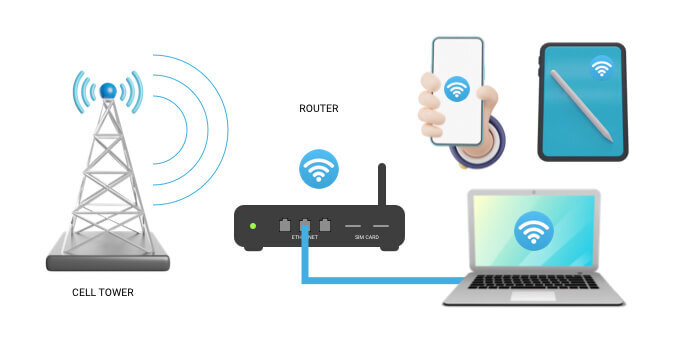
Performance will depend on your cellular signal strength. In weak signal areas, you’ll notice slower speeds and a less reliable connection. If cellular signal is unavailable, your internet connection will drop.
What’s the Difference Between a Cellular Router and a Hotspot?
Since both cellular routers and hotspots provide internet access through cellular networks, they are often coined the same. However, they are not the same. Here are the top key differences:
- Device Capacity and Power: Designed with more robust hardware, cellular routers support more devices and can handle higher data loads than hotspots.
- Portability: Cellular routers need a consistent power connection. Thus, they require fixed or semi-permanent setups. Hotspots are compact, rechargeable, and easy to carry around, making them perfect for secure internet in public places or on the go.
- Coverage and Stability: More powerful, cellular routers tend to offer better signal range and deliver a more stable internet connection in more places than a portable hotspot.
- Features and Customization: Cellular routers come with advanced features like failover WAN, multiple LAN ports, GPS, and external antennas, while hotspots feature a simpler design focused on providing quick, portable internet access.
See the table below or a quick cellular router vs hotspot snapshot:
| Features | Cellular Router | Hotspot |
| Capacity | Supports multiple devices | Supports fewer devices |
| Portability | Best for fixed or semi-permanent applications | Highly portable and is designed for on-the-go use |
| Signal Range | Larger signal range with external antennas | Limited signal range covering smaller areas |
| Usage | Ideal for homes, offices, remote sites, and vehicles | Ideal for personal, temporary or mobile use |
| Connection Type | Provides both Ethernet and wireless connections | Provides only Wi-Fi connections |
Where Can I Use a Cellular Router?
Cellular routers are ideal for various applications, including:
- Homes without access to reliable wired internet services.
- RVs, semi-trucks, buses, trains, boats, and other vehicles that need internet access on the go.
- Businesses who want to use cellular as their primary or backup source of internet.
- IoT applications requiring a consistent internet connection for instant data transmission.
How to Choose the Best Cellular Router for Me?
Not all cellular routers are made equal. To find the best cellular router for you, here are a couple of features to lookout for:
Network Support
Some cellular routers only work with 4G, while others support 5G and are backward compatible with 4G. 4G routers offer reliable and relatively fast speeds for streaming, browsing, video conferencing, and more. For critical ultra-high-speed connectivity, data-intensive tasks, or to simply futureproof your network, 5G routers are a must.
Connectivity Options
Every cellular router offers different ways to connect your devices. The most common are via Ethernet LAN or WiFi. For more advanced connection options, there are cellular routers that support devices over Bluetooth, USB, Serial, and multiple I/O. Those with a built-in WAN port can serve as a backup for your wired internet.
SIM Card Slots
Cellular routers can support 1, 2, or 4 SIM cards at a time from different cellular providers. Using more than one SIM card enhances redundancy, allowing the cellular router to automatically switch between SIM cards if a network becomes unstable or unavailable. This facilitates a stronger, uninterrupted internet connection, perfect for mobile applications.
GPS Capabilities
For transportation vehicles, unmanned vehicles, and robot fleets, cellular routers with GPS help provide valuable location tracking and monitoring of your assets.
Data Speed
Cellular routers will range in the data speed they can offer. 5G routers can support faster speeds than 4G routers. A cellular router that can deliver higher speeds is essential for more demanding applications. Make sure to pick a cellular router that meets your specific usage requirements.
Total Users
Neither 4G cellular routers nor 5G cellular routes support an unlimited amount of devices at a time. Before you buy, consider how many devices you’ll need to connect to make sure the cellular router can handle them.
Security
Security features are crucial for protecting your data. Some routers offer basic security while others, like industrial cellular routers, offer more robust encryption, firewalls, and other advanced security measures to safeguard your network.
Design
The design of a cellular router should fit your operational needs. There are basic, sleek models that are perfect for homes and offices. For environments prone to dust, moisture, and extreme temperatures, an industrial-grade cellular router is best.
Where Can I Get a Quality Cellular Router?
Wilson Amplifiers is a leading provider of cellular routers by Telonika and Peplink. We’ve made sure to partner with industry-leading brands and provide high-quality and affordable cellular routers that will keep essential devices connected at home, in the office, at remote sites, or on the go. Here is a short overview of our top-selling cellular routers.
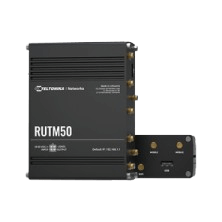
This is the most affordable catch-all 5G cellular router. The 5G cellular router comes with dual SIM card slots and GPS connectivity. It’s ideal for applications such as IoT, transportation, offices, and more.
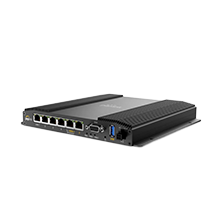
The Max BR2 Pro is the most advanced 5G cellular router built to deliver robust connection. Compatible with Peplink’s SpeedFusion, you’re able to build an unbreakable connection. This router's most ideal applications include RVs and businesses.
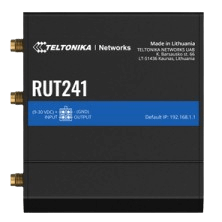
Powerful and compact 4G cellular router.
Buy Now: $199.00The Teltonika RUT241 is the perfect industrial cellular router for IoT. Compact and rugged design enables easy deployment anywhere. It offers speeds up to 150 Mbps and two Ethernet ports (1 LAN and 1 WAN).

Compact 4G cellular router with advanced features.
Buy Now: $349.99This is Peplink’s most compact cellular router built with WiFi 5 technology. It can deliver speeds of up to 300 Mbps. The Peplink Max BR1 Mini Cellular Router comes with a combination of LTE, WiFi, and Ethernet connection options making it ideal for your home, office, transportation, or IoT applications.
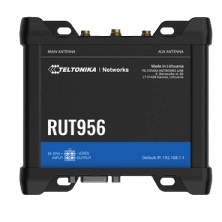
4G cellular router with versatile connectivity options.
Buy Now: $299.00Teltonika RUT 956 is an Industrial-grade and feature-packed cellular router. It’s built with multiple connectivity options for modern and legacy devices. Rugged housing ensures great performance in various applications.
If you have any questions about cellular routers or need help finding the right one, contact us today at 1-800-568-2723 or email us at sales@wilsonamplifiers.com. We’re happy to help!


Money Back Guarantee

Technical Support